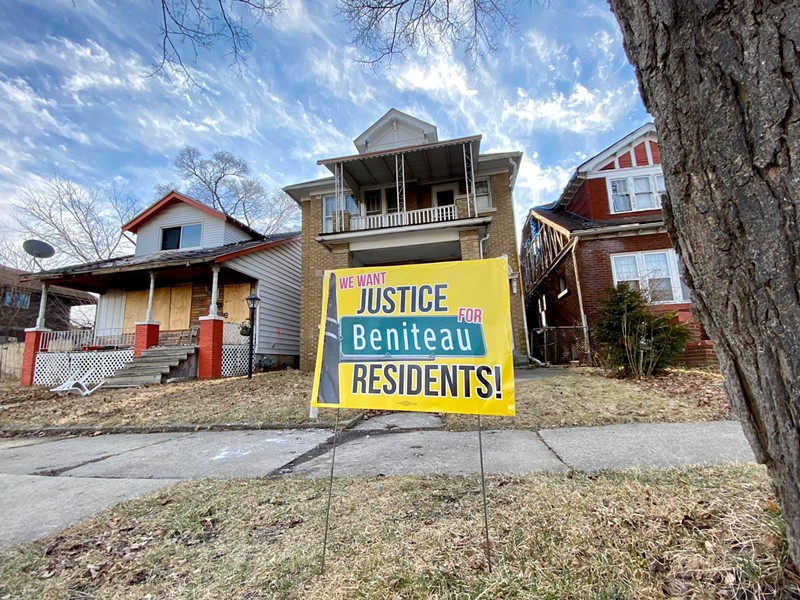
Justice for Beniteau Residents
The area surrounding the Stellantis' Jeep plant in Detroit is covered in an overwhelming odor.
Even on hot days, Victoria Thomas won’t open the windows of her house because an orange powdery substance will coat her furniture.
The retired locker room attendant from Detroit Public Schools lives in a predominantly Black neighborhood near Stellantis’ Jeep assembly plant on St. Jean on the city’s east side, where residents have complained about a host of environmental hazards.
Thomas often has a burning sensation in the back of her throat, and she has chronically watery eyes and a persistent cough. Her sister developed a rare inflammatory disease and decided to move. After her aunt developed a persistent and painful cough, she also moved.
Thomas is among five residents who have filed a civil rights complaint against state environmental regulators in November for allowing the plant to increase emissions of toxic contaminants. They also allege the Michigan Department of Environment, Great Lakes and Energy (EGLE) failed to analyze the cumulative impact of air pollution before issuing the emission permits.
Responding to the complaint, the Environmental Protection Agency (EPA) is investigating whether the state’s decision to allow an increase in emissions amounts to racial discrimination.
The EPA notified EGLE last week that it was reviewing the permit process.
The complaint, filed by the Great Lakes Environmental Law Center, alleges EGLE violated the Civil Rights Act by issuing permits in an area that is predominantly Black and lower-income and has historically been inundated with environmental contamination.
“The decision by Michigan’s Department of Environment, Great Lakes, and Energy (EGLE) allowing Stellantis to significantly expand its facilities continues the discriminatory legacy of requiring communities of color to bear the disproportionate burden of the industrial pollution generated by all of society,” the complaint states.
EGLE allowed Stellantis to increase volatile organic compound emissions in exchange for decreasing the same emissions at the Warren Truck Assembly Plant in Warren, which surrounds predominantly white neighborhoods.
In the area near the Jeep assembly plant, the asthma rate is nearly twice the state average, and more than two-thirds of the children are impoverished.
“EGLE’s decision to issue numerous permits requested for the Stellantis Complex in a short period, which allowed for a significant enlargement of air emissions in a low-income community where nearly all residents within 1 mile are people of color already inundated by other industrial sources, amounts to discrimination of the basis of race, color, and national origin in violation” of federal law, the complaint states.
EGLE said it welcomes EPA’s review and is prepared to take action.
“Michigan EGLE looks forward to EPA’s review of Michigan permitting decisions and processes to ensure that the state is doing everything within its authority to protect vulnerable communities, and to receive guidance from EPA in doing so most effectively,” EGLE spokeswoman Jill A. Greenberg said in a statement to Metro Times on Friday.
Over the past year, residents have complained of a nauseating smell wafting from the plant. EGLE has issued three air quality violation notices to Stellantis and is working with the automaker to address the chronic stench.
In addition to suffering adverse health effects, residents also complain of loud noises, including diesel engines roaring at all hours.
Neighbors are moving away and can’t sell their homes. Left behind are vacant houses that are driving down the property values.
Robert Shobe, one of the complainants, has cancer and chronic obstructive pulmonary disease and gets frequent headaches, coughing fits and bouts of nausea. He’s so worried about the health hazards that he doesn’t invite friends or family to visit him.
Akishia Hunter, another complainant, spent months in hotels to get away from the health hazards and loud noises but she can no longer afford it. She worries about her son’s severe asthma.
“You barely sleep,” she said in the complaint.
“At its core, EGLE has participated in the creation of a class of internally displaced peoples, forced from their homes by decades of compounding discriminatory decisions that have resulted in this man-made crisis,” the complaint states.
Stay connected with Detroit Metro Times. Subscribe to our newsletters, and follow us on Google News, Apple News, Twitter, Facebook, Instagram, or Reddit.






